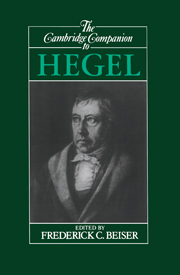Book contents
- Frontmatter
- Introduction
- 1 Hegel's intellectual development to 1807
- 2 You Can't Get There from Here
- 3 Hegel's conception of logic
- 4 Hegel's idealism
- 5 Hegel's dialectical method
- 6 Thought and being
- 7 Hegel's ethics
- 8 The basic context and structure of Hegel's Philosophy of Right
- 9 Hegel's historicism
- 10 Hegel on religion and philosophy
- 11 Hegel's aesthetics
- 12 Transformations of Hegelianism, 1805-1846
- 13 Hegel and Marxism
- 14 Hegel and analytic philosophy
- Bibliography
- Chronology
- Index
12 - Transformations of Hegelianism, 1805-1846
Published online by Cambridge University Press: 28 May 2006
- Frontmatter
- Introduction
- 1 Hegel's intellectual development to 1807
- 2 You Can't Get There from Here
- 3 Hegel's conception of logic
- 4 Hegel's idealism
- 5 Hegel's dialectical method
- 6 Thought and being
- 7 Hegel's ethics
- 8 The basic context and structure of Hegel's Philosophy of Right
- 9 Hegel's historicism
- 10 Hegel on religion and philosophy
- 11 Hegel's aesthetics
- 12 Transformations of Hegelianism, 1805-1846
- 13 Hegel and Marxism
- 14 Hegel and analytic philosophy
- Bibliography
- Chronology
- Index
Summary
The relationship between Hegel and Hegelianism will be approached in this essay in terms of the creative appropriation, reproduction, and transformation of the philosophical position articulated in Hegel's lectures and published texts. The term “Hegelianism” is not meant to designate appropriation or use of specific Hegelian arguments or judgments, but commitment to a general theoretical perspective or framework, to a specific way of prefiguring the field of knowledge and construing the relations of elements within that field. Switching to a linguistic metaphor, one could describe “Hegelianism” as a semiotic system, a distinctive “language” that defined the meaning of individual “signs” and within which all specific questions were addressed and problems resolved. For the intellectual historian, the history of Hegelianism is the story of the temporal connections between texts that define and order the totality of beings in the world told in Hegelian language.
- Type
- Chapter
- Information
- The Cambridge Companion to Hegel , pp. 378 - 413Publisher: Cambridge University PressPrint publication year: 1993
- 6
- Cited by

